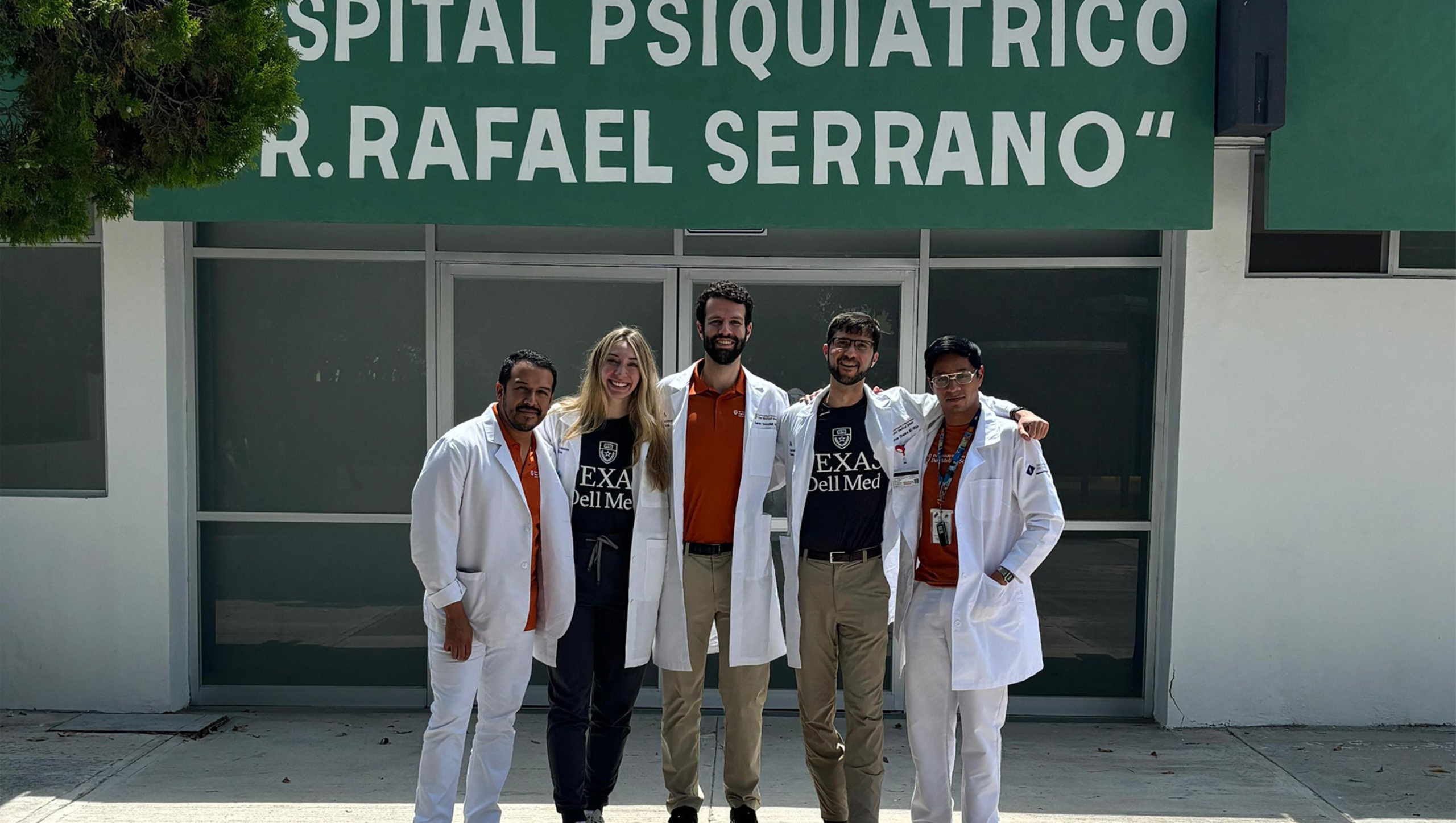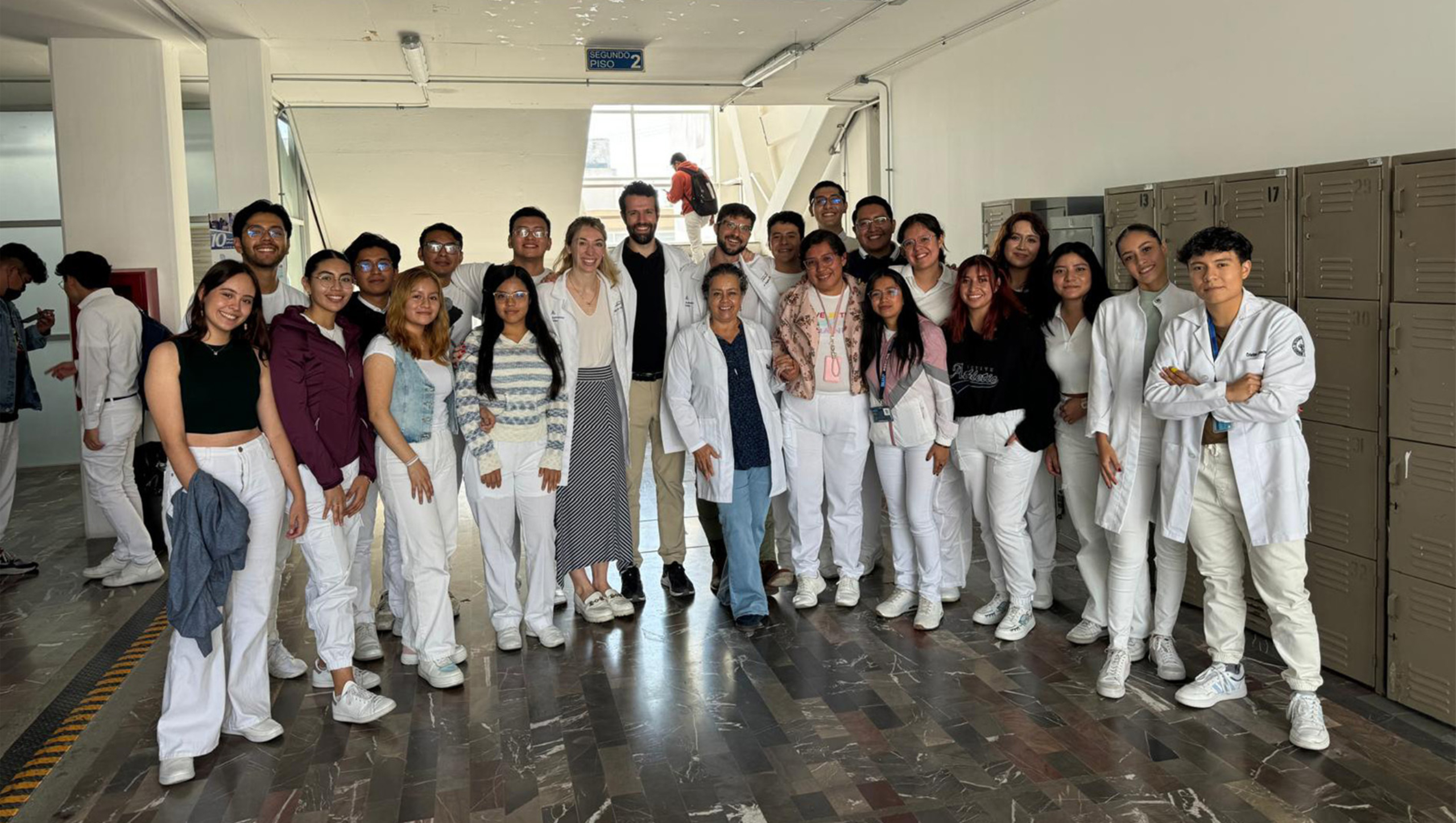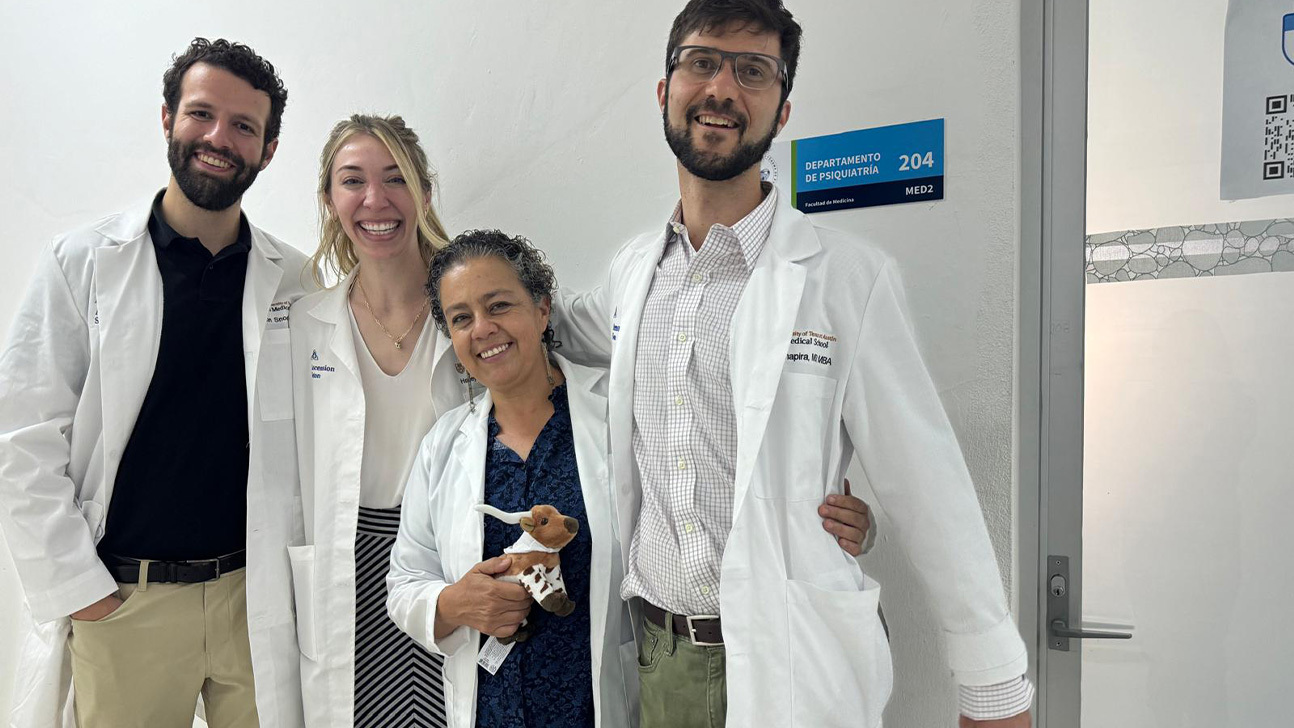
Dell Med psychiatry residents team with Benemérita Universidad Autónoma de Puebla faculty at a local psychiatric hospital as part of a Spanish language immersion elective.
Three Dell Medical School psychiatry residents arrived for their month in Mexico, ready to start the Spanish language immersion elective, connect with professional peers and expand their own horizons toward providing better care to patients. Though their goals were the same, each resident faced some surprising first-week challenges.
“We recognized that psychiatric terminology is not exactly the same in Mexico,” said Itamar Shapira, second-year resident. “There are aspects of the mental status exam that they are more attuned to than we are. Perhaps because our languages have different idiosyncrasies. I did not know Spanish at all before coming to Mexico and felt like I was in a true crash course.”
The other two residents in the elective, both of whom came with more experience in Spanish, noted something new for them too.
“All of the students were really engaged and asked excellent questions that always kept us on our toes,” said Aaron Snodell, a second-year resident who also co-taught the Introduction to Psychiatry class for medical students. “Teaching in another language really solidified my ability to explain core concepts of psychiatry in Spanish.”
“I have never lived with a host family before, and I was surprised to find that it was definitely one of the most enriching parts of my experience,” said second-year resident Hailey Barab, whose host family threw her a birthday celebration with music and homemade cake during their time in Puebla. “My host mother and I had dinner together every night, where we would recount my day and discuss an array of topics ranging from medicine to governmental policies. I felt like I had made a new family abroad.”
Expanding Language Immersion
The Spanish language immersion elective in Puebla, led by the Department of Pediatrics and the Division of Global Health, opened first to pediatric Dell Med residents in 2022. But in this first year of psychiatry department participation, the residents were also involved in educational efforts at Benemérita Universidad Autónoma de Puebla’s medical school, bolstering an existing partnership as part of the AMPATH institutional collaboration in Mexico.

Dell Med psychiatry residents join Benemérita Universidad Autónoma de Puebla medical students in their psychiatry course.
“We hope to expand our collaborations with the BUAP medical school psychiatry department, including research,” said Charles B. Nemeroff, M.D., chair of the Department of Psychiatry and Behavioral Sciences at Dell Medical School, who has expressed support for this program since its inception. “Our hope is to develop this program into a two-way street in which students and residents at BUAP are able to visit Dell Medical School on a regular basis. The Spanish immersion that our residents receive will have immediate impact, as a sizeable proportion of our patients in our hospital and clinic settings are Spanish speakers.”
The residents worked with their Mexican peer counterparts in the medical school at Benemérita Universidad Autónoma de Puebla to optimize their provided presentation materials for content, clarity, and personal teaching styles. Their efforts were a key support for BUAP medical school’s head of psychiatry Minou del Cármen Arévalo Ramírez, who leads the psychiatry instruction for 6,000 medical students. Under her direction, the residents developed introductory psychiatry curriculum in Spanish and taught multiple classes per day. They also stayed with host families who helped them get acquainted with local life and leisure.
“Having a host family was a great way to be fully immersed,” Snodell said. “My host sister’s husband is a luchador, so we were lucky enough to get to see one of his luchas. I perhaps was cheering for him too hard … his opponents took notice of me and taught me many new colorful words!”
From one-on-one daily language lessons at the Spanish Institute of Puebla and enjoying home-cooked meals with their host families to delivering three-hour midweek lectures on basic psychiatry for medical students at BUAP and learning about the Mexican mental health care system while shadowing the psychiatry residency director Norma Breton at Hospital Psiquiátrico Rafael Serrano, the residents’ routines were designed to maximize their practical exposure to Spanish language in professional and personal contexts.
“We were able to tailor our language lessons to the specific areas I wanted to work on,” Snodell said. “Many days my tutor acted as a standardized patient in different scenarios, including a suicidal patient, a manic patient and as the parent of a child patient with ADHD. It was great to get immediate feedback on how to navigate in a culturally sensitive way using the proper specific vocabulary that these situations require. I was then able to use these skills at the psychiatric hospital.”
“Shadowing physicians in the outpatient psychiatry clinic, as well as interviewing patients myself in the inpatient hospital alongside the other residents, was invaluable to my learning,” Barab agreed. “I was able to pick up on many nuances that are extremely pivotal to psychiatry, not only in vocabulary but also in context. False fluency is an important conversation to be had, and I want to remain mindful of my own limitations, to continue analyzing my skill level so that I may continue to grow and improve.”
A major benefit for residents in the elective is the opportunity to build peer-to-peer connections, said Claire Selinger, M.D., global health faculty and clerkship director in the Department of Psychiatry and Behavioral Sciences at Dell Med.
“Training can be overwhelming, and the collective experience is often what gets us through each day,” Selinger said. “One of the most surprising things to me was how much the residents enjoyed connecting with the residents in Puebla and socializing with them. This will help build their community of practice for the future.”

Left to right: Aaron Snodell, Hailey Barab, Minou del Cármen Arévalo Ramírez and Itamar Shapira.
In Puebla, the psychiatry residents shadowed Mexican residents at the hospital and offered mutual support in preparing lectures for students. They met for coffee, lunches and final week send-offs. And they’re still in touch with their counterparts over WhatsApp, agreeing that these relationships can positively impact training and patient care in both countries over the long term.
“You see both the degree to which systems and cultural components of the physician-patient relationship differ, but also the degree to which a lot of psychopathology is actually the same across borders,” Shapira said. “We usually came to the same assessments as our counterparts. And it is very satisfying to have relationships with colleagues who are in different settings to the ones we are used to.”
The hope is that the language elective continues — not only for psychiatry residents but also as a gateway to reciprocal exchange for mental health trainees and more from Puebla to visit Dell Med under the AMPATH partnership.
“Global Health electives expand our communities of practice so we make new connections and feel less alone,” Selinger said. “Experiencing the practice of psychiatry in a different country can make us see new ways of doing things.”